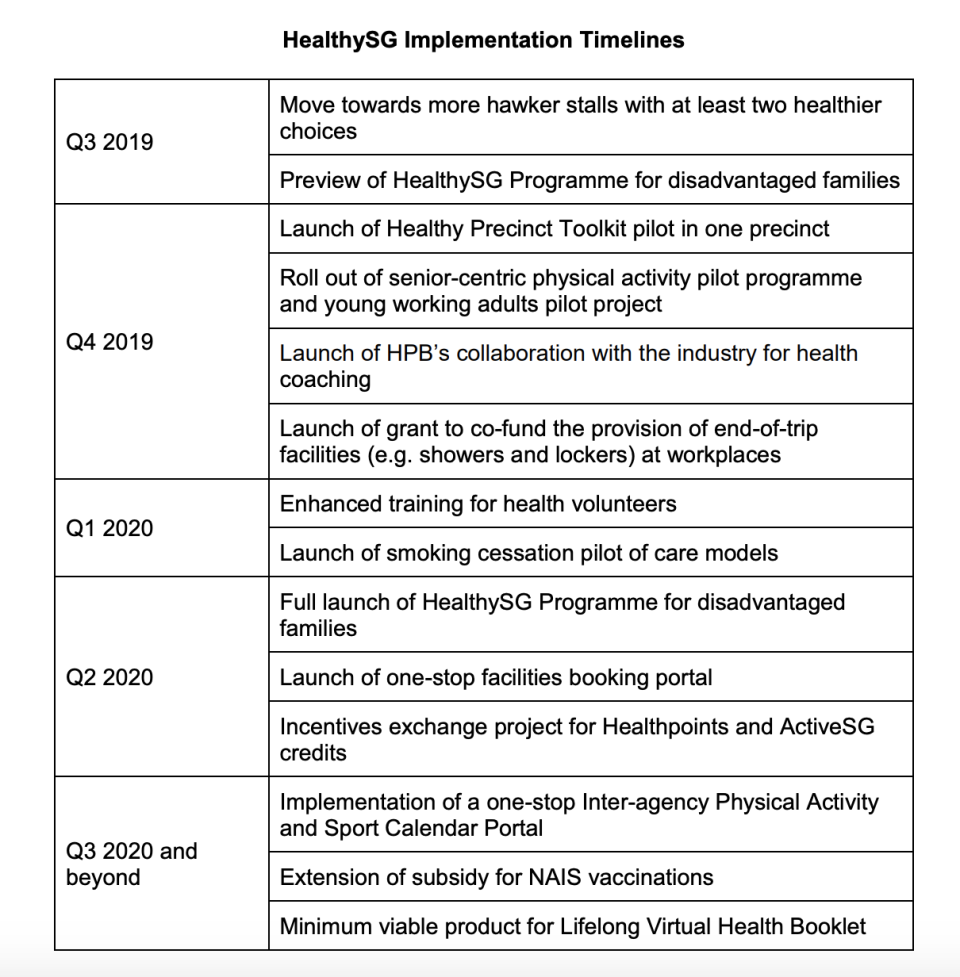Lower-income families partaking in healthy activities can earn incentives under new HealthySG Taskforce proposal

SINGAPORE — Lower-income families and other disadvantaged Singaporeans can soon earn incentives when they participate in healthy living activities, such as guided trails and nutrition workshops.
Among the incentives are the redemption of a free healthy grocery pack and the Health Promotion Board (HPB)’s Healthpoints.
This is a “shift in approach”, as the HPB’s efforts to date are mostly targeted at the general public, said the Ministry of Health (MOH) on Sunday (28 July).
“The MOH’s national population surveys have shown that disadvantaged groups, such as lower income families, generally smoke more, have higher BMI, exercise less and eat more unhealthily,” it added.
“For the first time, we are customising health promotion messages and efforts to the needs and circumstances of the lower-income groups.”
This is among the 11 recommendations proposed by the HealthySG Taskforce, which was formed last November to promote healthier living.
The other proposals include providing adults with subsidies for vaccines recommended under the National Adult Immunisation Schedule (NAIS) and investing $5 million into piloting new smoking cessation support programmes.
The NAIS was established in 2017 to provide people aged 18 and above guidance on vaccinations.
While Singaporeans are able to use up to $500 of their MediSave per year on recommended vaccines, coverage has been estimated to be low at around 14 per cent for influenza vaccination and 12 per cent for pneumococcal vaccination for those aged 65 to 74.
“With the introduction of subsidies, we hope to reduce the barriers for vaccination,” said the MOH, adding that it aims to more than triple the vaccination coverage for the recommended adult vaccines to over 50 per cent within five years from the roll out of the subsidies.
The ministry will also work with public healthcare institutions to better identify and refer structured smoking cessation programmes to smokers who are planning to quit.
“We will systematically reach out to all smokers who receive treatment at the public healthcare institutions and offer fully subsidised nicotine replacement therapy tied to these pilots, such as nicotine gum and patches, to complement existing cessation counselling,” it added.
The new smoking cessation support programmes, which are expected to reach at least 10,000 smokers over the next two years, will be rolled out at all public hospitals and at least three polyclinics.
The taskforce is chaired by Senior Parliamentary Secretary (SPS) for Health and Home Affairs Amrin Amin. Its members are SPS for Transport and Culture, Community and Youth Baey Yam Keng, SPS for Education and Manpower Low Yen Ling, SPS for Education and Social and Family Development Muhammad Faishal Ibrahim and SPS for Home Affairs and National Development Sun Xueling.
Since its formation, it has engaged close to 300 Singaporeans, aged 18 to 60 years old, through focus group discussions, public engagement sessions and an online consultation.
The other recommendations include increasing the number of hawker stalls that offer at least two healthier options by 400, co-funding end-of-trip facilities, such as showers and lockers at workplaces, as well as implementing a life-long virtual health booklet for individuals to track their health status.
Most of them will be rolled out by next year.
The taskforce will be publishing a report detailing its recommendations at the end of the year.

More Singapore stories:
Suicide numbers rose 10% in 2018, still leading cause of death for youths: SOS



